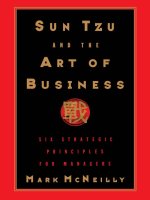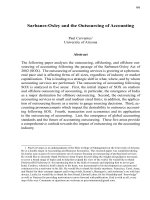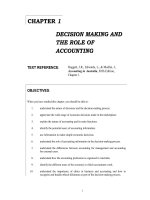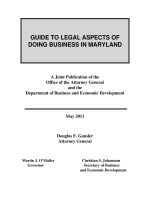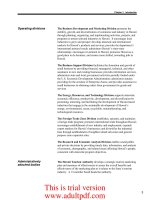accounting education, socialization and the ethics of business
Bạn đang xem bản rút gọn của tài liệu. Xem và tải ngay bản đầy đủ của tài liệu tại đây (294.61 KB, 31 trang )
Strathprints Institutional Repository
Ferguson, John and Collison, David and Power, David and Stevenson, Lorna (2011) Accounting
education, socialisation and the ethics of business. Business Ethics: A European Review, 20 (1).
pp. 12-29. ISSN 1467-8608
Strathprints is designed to allow users to access the research output of the University of Strathclyde.
Copyright
c
and Moral Rights for the papers on this site are retained by the individual authors
and/or other copyright owners. You may not engage in further distribution of the material for any
profitmaking activities or any commercial gain. You may freely distribute both the url (http://
strathprints.strath.ac.uk/) and the content of this paper for research or study, educational, or
not-for-profit purposes without prior permission or charge.
Any correspondence concerning this service should be sent to Strathprints administrator:
mailto:
/>
Ferguson, John (2010) Accounting education, socialization and the ethics of business. Business
Ethics: A European Review . ISSN 0962-8770 (Unpublished)
/>
Strathprints is designed to allow users to access the research output of the University
of Strathclyde. Copyright © and Moral Rights for the papers on this site are retained
by the individual authors and/or other copyright owners. You may not engage in
further distribution of the material for any profitmaking activities or any commercial
gain. You may freely distribute both the url () and the
content of this paper for research or study, educational, or not-for-profit purposes
without prior permission or charge. You may freely distribute the url
() of the Strathprints website.
Any correspondence concerning this service should be sent to The
Strathprints Administrator:
ACCOUNTING EDUCATION, SOCIALIZATION AND THE ETHICS OF
BUSINESS
John Ferguson
1
*
, David Collison
2
, David Power
3
and Lorna Stevenson
4
1. *Corresponding Author: Lecturer in Accounting and Finance, School of
Management, University of St. Andrews, Scotland, KY16 9SS, UK, Tel: + 44
(0)1334 462809, Fax: +44 (0)1334 462812, e-mail:
2. Professor of Accounting and Society, School of Accounting & Finance, University
of Dundee, Scotland, DD1 4HN, UK, Tel: + 44 (0)1382 384192, Fax: + 44 (0)1382
388421, e-mail:
3. Professor of Business Finance, School of Accounting & Finance, University of
Dundee, Scotland, DD1 4HN, UK, Tel: +44 (0) 1382 384854, Fax: + 44 (0)1382
388421, e-mail:
4. Senior Lecturer in Accounting, School of Accounting & Finance, University of
Dundee, Scotland, DD1 4HN, UK, Tel: +44 (0) 1382 384196, Fax: + 44 (0)1382
388421, e-mail:
ACCOUNTING EDUCATION, SOCIALIZATION AND THE ETHICS OF
BUSINESS
Abstract
This study provides empirical evidence in relation to a growing body of literature
concerned with the “socialization” effects of accounting and business education. A
prevalent criticism within this literature is that accounting and business education in
the UK and US, by assuming a “value-neutral” appearance, ignores the implicit
ethical and moral assumptions by which it is underpinned. In particular, it has been
noted that accounting and business education tends to prioritise the interests of
shareholders above all other stakeholder groups. The paper reports on the results of a
set of focus group interviews with both undergraduate accounting students and
students commencing their training with a professional accounting body. The
research explores their perceptions about the purpose of accounting and the objectives
of business. Findings suggest that both university and professional students’ views on
these issues tend to be informed by an Anglo-American shareholder discourse,
whereby the needs of shareholders are prioritised. Moreover, this shareholder
orientation appeared more pronounced for professional accounting students.
KEY WORDS: accounting, Anglo-American capitalism, ethics education,
ideology, shareholder wealth, socialization
1
“By propagating ideologically inspired amoral theories, business schools have
actively freed their students from any sense or moral responsibility” (Ghoshal,
2005, p.76).
“Perhaps the best way… of making students aware of the contingent nature of
many of the prescriptions and axioms that their courses take for granted, might
be a course on comparative capitalisms” (Dore, 2006, p.18).
Introduction
There is a growing concern within the extant literature that accounting and business
education in the UK and US is failing to develop students’ ethical maturity. While
much of this research points to the lack of, or need for, business ethics courses which
address professional codes of ethics, or ethical decision making (Bampton & Cowton
2002, Bampton & Maclagan 2005, Beu et al. 2003, Bishop 1992, Cohen & Pant 1991,
Cohen et al. 2001, Gandz & Hayes 1988, Gowthorpe et al. 2002, Lombardi 1985,
McDonald 2005, Sims & Sims 1991), a number of studies have drawn attention to
two further, arguably more fundamental, ethical issues. More specifically:
(i) accounting and business education, by assuming a “value-neutral”
appearance, fails to acknowledge and address the ethical and moral
assumptions which underpin it;
(ii) accounting and business education fails to acknowledge alternative
frameworks which are guided by different sets of ethical and moral
assumptions.
In terms of the failure to acknowledge the value-laden nature of what gets taught on
accounting and business courses, it has been suggested that accounting and business
education can be described as a site of socialization, whereby students are inculcated
with a particular worldview which draws on the values and assumptions of Anglo-
American capitalism
1
(Frankfurter & McGoun 1999, Collison 2003, Dore 2006,
2
Ellsworth 2002, 2004, Everett 2007, Ferguson et al. 2005, 2007, Ghoshal 2005, Gray
et al. 1994, Neimark 1995, Perriton 2007, Schleef 1998, Springett 2005, Waddock
2004, 2005, Wolfe 1993). In particular, it has been noted that accounting and
business education reproduces and sustains the notion that society’s welfare is
optimised as a result of individuals acting in their own economic self-interest, and that
the only participants in the wealth creating process that should have their interests
maximised are shareholders (Collison 2003, Collison & Frankfurter 2000, Ellsworth
2004, Everett 2007, Ferguson et al. 2005, 2007, Gray et al. 1994, Waddock 2005,
Wolfe 1993). According to Ellsworth (2004: 66), the “dogma” of business education
in terms of propagating the “near religious… belief that maximization of shareholder
wealth is a corporation’s reason for existence” comes at the “expense of moral
courage and inspirational purpose”. Moreover, accounting and business students are
not encouraged to consider alternative ways in which society may be organised, or to
speculate upon the power asymmetries which underpin the prevalent worldview that
they encounter. Indeed, educators who attempt to introduce an alternative set of
beliefs tend to be marginalised (Ellsworth 2004, Ghoshal 2005).
In terms of the lack of consideration given to other frameworks, critics of
business and accounting education have suggested that restricting learning in this
way, without offering an alternative perspective from which students can exercise
their own reasoning ability is, in a sense, “indoctrination” (Loeb 1988, 1991, Van
Dijk 1998), the propagation of ideology (Ferguson et al. 2005, 2007, Ghoshal 2005,
Mir 2003) and encourages moral “atrophy” in students (Gray et al. 1994, Loeb 1991).
Moreover, the contestability of the “Anglo-American” framework in accounting and
business education is apparent by the very existence of alternative economic
frameworks to be found in continental Europe and Japan. These alternatives typically
3
favour a more balanced approach in terms of addressing the interests of a range of
stakeholders and, traditionally, do not accord primacy to shareholders or to the
maximisation of shareholder value. For example, Hutton (1996: 263) notes that while
social market Europe may conform to “market imperatives” there remains a
“partnership between labour and capital”. This “mitbestimmung (or co-decision
making) at both board and work council level” means that management relinquish the
“right to run business autocratically in favour of the shareholders’ narrow interests”
(Hutton 1996: 263; see also Collison 2003, Dore 2006).
One could also argue that students ought to be exposed to alternative
economic frameworks in light of social indicator research which suggests that Anglo-
American economies, where a shareholder orientation is prevalent, are characterised
by income inequality (Collison et al. 2007, Wilkinson 2005). Such research has drawn
attention to the link between income inequality, various health issues and violent
crime – for example, income inequality has been variously linked with psychosocial
factors such as depression, anxiety and drug use (Wilkinson 2005, Wilkinson &
Pickett 2009), child mortality (Collison et al. 2007) and gun crime (Kennedy et al.
1998). Moreover, given that the emphasis on maximisation of shareholder wealth, as
both an objective of business and a governance mechanism, has been implicated in the
current financial crisis, a further reason for encouraging business students to evaluate
alternative economic perspectives may be advanced. It is perhaps noteworthy that the
Financial Times, a hitherto defender of “shareholder capitalism”, has recently
questioned the merits of this system. As part of series entitled the “Future of
Capitalism”, the Financial Times has published articles which have argued that:
“the financial system has proved dysfunctional, how far can we rely on the
maximisation of shareholder value as the way to guide business? Events of
the past 18 months must confirm the folly of this idea As a defective financial
4
sector loses its credibility, the legitimacy of the market process itself is
damaged. This is particularly true of the free-wheeling “Anglo-Saxon”
approach.” (Wolf 2009)
While acknowledging the limitations of a maximisation of shareholder wealth model,
some contributors to the Financial Times series have recommended embracing
alternative models of capitalism. For example, Pilling and Atkins (2009) state,
“Nordic economies’ social welfare systems could offer lessons to the rest of the world
on how to reduce worker anxiety at a time of crisis and rapid change and on enabling
economies as a whole to restructure”
2
.
Therefore, at the very least, it has been argued that Anglo-American
accounting and business education should be “open to other options” (Ellsworth
2004: 67). As Neimark (1995) contends, such a restricted approach to learning and
teaching in Anglo-American countries serves merely to “naturalize” the status-quo by
treating deeply contestable underlying ethical assumptions as incontestable or
universal. It is in this respect that Alvesson & Willmott (1996: 204) refer to Business
Schools as “key socializing agencies for the intelligentsia of advanced capitalist
societies”.
A number of researchers have suggested that this constrained approach to
accounting and business education essentially limits the supposed benefits of add-on
courses in business ethics (i.e. the implicit approach adopted by much of the business
ethics literature). For example, Wolfe (1993: 2) argues that:
“If we look at many of the cases we find in business ethics textbooks, we see
that the protagonists are non-malevolent, ordinary people in middle or upper
management who usually act within a corporate hierarchy. The act itself, the
one identified as being the cause of a death or of some grave social harm, is the
result of managers doing essentially what they were taught to do! In the eyes
of students, our course in business ethics is interesting but really does not
challenge the substantial intellectual conditioning in the "functional areas" of
business at universities and in society at large. In [terms of the] long-term
5
impact on our students or our business culture, the course is way too little, way
too late”.
In other words, according to Wolfe (1993), providing “bolt-on” courses in
business ethics for accounting and business students is a limited activity, if the ethical
and moral assumptions underpinning mainstream or “functional” material are not
addressed (Cunliffe et al. 2002, Perriton 2007, Wolfe 1993). Similarly, Ghoshal
(2005) asserts that additional courses in business ethics have a limited effect because
they do not sufficiently challenge the underlying “common sense” assumptions which
help maintain and reproduce current social arrangements
3
. He states:
“If deans really intend to infuse a concern for ethics and for responsible
management in the research and teaching that are carried out at their
institutions, they have to acknowledge that the tokenism of adding a course on
ethics will not achieve their goals. As long as all the other courses continue as
they are, a single, stand-alone course on corporate social responsibility will not
change the situation in any way” (Ghoshal 2005: 88).
In the case of accounting education, it has been argued that the contestable
assumptions of Anglo-American capitalism are dissimulated
4
through the “guise of
technical rationality” (McPhail & Gray 1996: 27). In this sense, accounting education
“fulfils a crucial economic role in the maintenance of liberal neo-classical economics”
which it achieves through its presentation of accounting as an innocuous technical
process (McPhail & Gray 1996: 28-29; see also, Gray et al. 1994, Humphrey et al.
1996). According to Collison (2003: 861):
“Attention to the interests of shareholders above all other groups is implicit in
much of what is taught to accounting and finance students. The very
construction of a profit and loss account… is a continual, and usually unstated,
reminder that the interests of only one group of stakeholders should be
maximized”.
Moreover, Collison (2003: 861) argues that, “it may be very difficult for accounting
and finance students to even conceive of another way in which affairs could be
6
ordered… even at the algebraic level, let alone the moral”. However, as Waddock
(2005: 147) points out, accounting is an “ethical, rather than a technical, discourse”,
adding:
“If we want accountants who are capable of acting with integrity and
understanding the broader system in which they work, we must teach them to be
mindful – aware of their belief systems, conscious of consequences, and capable
of thinking broadly about the impact of their actions and decisions” (emphasis
added)”.
The aim of the present paper is to explore whether, or the extent to which,
students’ ethical and moral thinking is informed by an Anglo-American shareholder
discourse. In addressing this aim, this study ascertains students’ views on: (i) the users
for whom they believe accounting information is prepared, and (ii) the objectives of
business (or more specifically, the constituencies for whose benefit business activity
is undertaken). By drawing on students’ rationales and justifications regarding these
issues, this exploratory study investigates whether a particular worldview is prevalent
among accounting students and the extent to which they are aware of alternative
perspectives. The following section outlines the method and context for this study.
Method and Context
In order to explore accounting students’ views regarding the users of
accounting information and the objectives of business, focus group interviews were
undertaken with two cohorts: first year undergraduate accounting students and
students commencing their training with a professional accountancy body. Both
groups were interviewed at the end of their initial course in financial accounting. The
focus groups were undertaken at four separate research sites; at three university
institutions and with professional trainees from one of the major accounting bodies in
the UK. The focus group interviews were part of a larger investigation into the
7
ideological characteristics of accounting education. As part of the larger project, a
two-stage questionnaire was distributed at four separate sites: the four sites which are
also the focus of the present study
5
. The questionnaire explored students’ perceptions
of the purpose of accounting information, the objectives of business and their
recommended course material, at both the start and end of an introductory course on
accounting. Respondents to the questionnaire were invited to contact the lead author if
they were willing to participate in a focus group interview. Focus group interviews
with students were subsequently arranged from a list of those responding to this
invitation.
Each focus group varied in terms of the number of students present and the gender
mix. Contextual information regarding the research sites and the composition of the
focus groups is provided in Table 1. Each focus group lasted one hour, and all four
focus group meetings were recorded and transcribed. All of the focus group meetings
were attended by two members of the research team who distributed a list of questions
for guiding the discussion. Interjections by the researchers were kept to a minimum
and were only made after significantly long pauses in the focus group participant
contributions (Krueger & Casey 2000). Probing questions were used when
participants comments were ambiguous or to encourage further clarification. Care was
taken during the focus group discussions to manage “dominant talkers” and to
encourage shy respondents: more specifically, the use of body language and the more
“frontal tactic of verbally shifting attention”, was employed when necessary (Krueger
& Casey 2000: 111).
Insert Table 1 about here
8
There are important methodological reasons for approaching the study in this
way. Drawing on the sociology of education literature, and, in particular, the work of
Apple (2004), one must be careful not to view the education process in terms of a
simplistic “input-output” model – i.e. where students (the input) become socialized by
an ideological curriculum that reflects the interests of dominant groups within society
and go on to reproduce those values in varying aspects of their lives (the output).
Research in this tradition often speculates on the consequences of the educational
process by analyzing the content of the curriculum alone – i.e. without attending to
the views and understanding of the participants in the process. Moreover, according
to Apple (2004) such a perspective overlooks a number of pertinent issues; more
specifically, it fails to consider the role of contestation and the contingent possibility
that students may resist or appropriate the ideological messages they encounter (Apple
2004, Thompson 1990).
Similarly, as Thompson (1990) delineates, if one is exploring the ideological
character of a media message (or in this case, an educational process), it is important
to look, not only at the content of the message (or process), but also to consider
aspects of production and reception (see Ferguson 2007 for an overview of this
framework). As discussed above, the findings presented in this paper are a part of a
larger study into the ideological character of recommended accounting materials.
Drawing on Thompson’s (1990) depth-hermeneutical framework, this larger body of
work has considered the production, content and reception of recommended course
material. While findings from this larger body of work have reported specifically on
the production of recommended materials (Ferguson et al. 2006) and their content and
reception (Ferguson et al. 2008), this study focuses on students’ views regarding the
9
users of accounting information and the objectives of business in general. In
summary, it is not simply enough just to assume that because a course or a degree
programme is underpinned by a particular perspective, that students will become
socialized in to that way of thinking (which is the implicit assumption in many of the
criticisms of accounting and business education) – instead, one must take into account
the ways in which students interpret, understand and appropriate the messages they
receive (Thompson 1990).
The remainder of this paper is structured as follows: The following section
reports on the results of four focus group investigations; these were undertaken at the
three academic institutions as well as in the office of an accountancy firm. The results
of the focus groups will be discussed under the following headings: users of
accounting information; alternative perspectives/other users; in whose interests are
companies run?; and the objectives of business. The final section summarises the
results and concludes.
Findings
Users of accounting information
Students were first of all asked to identify, for whom, from a list of possible users of
accounting information, they thought financial statements were prepared. The list of
stakeholders was derived from the International Accounting Standards Board’s,
Framework for the Preparation and Presentation of Financial Statements and
included present and potential investors, employees, lenders, suppliers and other trade
creditors, customers, governments and their agencies and the general public
(International Accounting Standards Committee Foundation, 1989). Responses were
consistent across each group, with shareholders being identified as the principal users
10
by the majority of participants. For example a typical response, from Student A1,
indicated that:
Shareholders… because technically they own the company and they will want
to know how their investment is doing.
Student B1 agreed when he noted that “advisors and shareholders” were the main
users. Student C1 was even more emphatic when he stated that:
I think the shareholders - that’s why you need to make a profit, to pay the
shareholders.
Professional students’ responses did not differ from their university student
counterparts, with shareholders being identified as the principal target for accounting
information. For example, Student P1 explained:
I see accounts being prepared for shareholders or for whoever owns the
business for whatever purposes they want… Shareholders generally don’t
have a hand in the running of the business, so the accounts let the
shareholders see how [management] are doing.
Similarly, Student P3 noted that “managers have a responsibility to the owners of the
business” implying that managers prepare financial accounts primarily for
shareholders. Even when other possible users were identified by students, it was
because they were deemed to share the owners’ goals, normally by virtue of being
shareholders themselves. Thus, Student A2 suggested that:
Some employees might hold shares in the company… so they might want to
know whether they should sell their shares in the company… or to encourage
employees to buy shares.
Similarly, Student C2 argued that “a lot of employees [will be] shareholders
anyway… so I think it is quite important for them as well”. Students were asked to
differentiate between what they deemed to be current practice in the production of
financial statements, and to comment on whom they felt these should be prepared
11
for. In most cases, the question elicited a similar response. For example, Student
A5 stated that:
I think primarily for shareholders, because they own the company and have
put their money in the company. They have more of a financial interest,
whereas the other interest groups don’t have such a financial interest.
Student C2 concurred with this view when he noted that “the shareholders are the
most important ones”. Similarly, all of the professional students identified
shareholders as the constituency for whom financial statements should be prepared.
For example, Student P3 noted that, “it depends on the type of company and on their
business agenda” adding “if it is a purely profit driven company, then the accounts
will matter to [the shareholders] more than the general public or the government”.
When the participants were asked why they felt that the shareholders were
the most important group, they typically pointed to the financial interest which
shareholders have by virtue of their ownership of the company. Thus Student B3
argued that shareholders were the main users since “they’ve got a financial
interest”, while Student B4 justified the choice because “[shareholders] own the
company”. Student C2 made a similar decision in favour of shareholders “because
they’re the ones that put the equity into the business”.
Students were asked to contemplate whether employees also had a financial
interest in a company. Respondents tended to draw a distinction between the
employee and the shareholder on the basis of risk: since the employee enjoyed a
steady flow of income in the form of a salary/wage, shareholders were deemed to be
at a greater risk of losing their investment if the company failed. Therefore, Student
A5 stated that:
12
Most employees will not have much interest in the annual reports of a
company. As long as they were getting a wage at the end of the month. Most
of them won’t be interested in the company report.
Student B4 agreed when he noted that:
At the end of the day, the shareholders are putting in the initial investment,
whether it’s buying initial shares or reinvesting in more shares. I am
assuming their initial investment will be much more than an employee.
[Employees] are investing their time and effort, and they are getting
remunerated for that. Investors don’t get anything back unless the company
is successful.
Alternative perspectives/other users
Not all participants agreed that shareholders should be the main focus of company
financial statements. In all three of the University groups, there was typically one
group member who felt that a wider range of users should be considered, or that
particular user groups should feature more prominently. For example, in the first
group, Student A3 argued that:
Although shareholders are important, creditors are probably more
important, because at the end of the day, they are going to decide whether
you [remain in business].
In the second group, Student B1 also suggested that the needs of stakeholders other
than shareholders should be addressed by companies:
You’ve got to count the rest of them… Loan creditors want to know what
their business is about and if they can afford to pay them back. I think
[financial statements] should be focused towards the shareholders - but they
should also include more information so that other groups will benefit from
them as well… like something that employees could benefit from, or other
groups. So it is not solely aimed at just the shareholders.
When asked to consider whether companies should produce information other than
financial information in their annual reports, participants were quick to point out that
13
non- financial information would be of benefit to users other than shareholders, such
as customers and the general public. For example, Student A5 stated that:
Some customers may be interested in the social and environmental side [of
the business], especially oil companies like Shell, whose company report has
a lot of environmental stuff in it. They might be more interested in that rather
than the financial side of the company.
Student B4 agreed and noted that:
If you were sort of an ethical consumer and you wanted to know the trading
policies that a company had… whether they outsourced manufacturing to a
foreign country … My wife’s like that. She didn’t like buying Nike because of
the fact that they use the factories and the wee kids to produce their Nike
branding. She wants to help the planet. She’s a health visitor.
This view was supported by student C4 who argued that:
People are more interested in the ethical side of business these days; they are
interested in the accounts and stuff but I think it’s got more important to
people, you know environmental issues and things like that… I think the
general public would understand that [information] more than financial
documents because I think your average person on the street… I don’t think
they would know where to look to be able to get hold of financial documents
and then second of all, I don’t think they’d understand them unless they had
some sort of accounting or financial background… they’d be more likely to
understand the ethical sort of side of things.
However, whilst focus group participants were aware that customers and the wider
public were interested in social, environmental and ethical information pertaining to
companies, Student B5 asked, “but is that really accounting information?”. Indeed,
despite identifying the wide range of information that other stakeholders would
benefit from, the majority of participants still maintained that company financial
statements should be produced for shareholders. They seemed to have difficulty in
conceiving of how alternative annual reports might be constructed or whether the
current structure of financial statements was appropriate for other stakeholder groups.
14
Unlike the university focus groups, there was less evidence of any professional
trainees holding an alternative perspective about who financial statements should be
prepared for. However, Student P4 noted that:
For public companies, in my small person’s view of things, you would like to
see transparency through everything. That would be the ideal, but it is never
going to happen. I think for small businesses which don’t really have much
effect over a big area, then it is not so necessary.
In whose interests are companies run?
Despite identifying shareholders as the principal users of accounting information,
students from University A did not identify shareholders as the group for whom
companies were run. For example, Student A5 stated that companies should be run
primarily in the interest of customers:
If you take care of the customer the business will take care of itself. If you
keep your customers happy, they will keep on coming, and that means you
can keep on your employees.
Students at Universities B and C made the link between the principal users of
financial statements, and the interests for which they perceived companies were run –
identifying shareholders in each case. Thus, Student B3 commented that, “it all comes
back to shareholders, doesn’t it? Getting their worth.” In addition, Student C5 noted
that “In a corporation there seems to be an emphasis that the shareholders are the
people that you’re doing it for”. Like the university students interviewed, professional
trainees identified shareholders as the group for whom companies are run. In their
remarks, professional students alluded to their training materials as the source for their
views. For example, Student P1 stated,
We are told in our… notes [on our first module] that directors run the
business in the best interests of the shareholders.
15
Perhaps by virtue of companies being constructed as separate legal entities, a
number of students viewed the company as an abstract entity which pursued its own
interests, and which was run essentially for itself. The comments of Student A5
typified this view, when she stated that “[Companies are run for] themselves. I think it
is in the company’s own interest to make a profit”.
On a few occasions, students had to be pushed to identify groups or individuals
that would benefit from a company’s pursuit of profit. A striking aspect of this
perspective, is that by constructing the company as an abstract legal entity, the
interests which are served as the result of corporate activity are somewhat obscured.
An example of this obscuring of interests was given by a student at University A.
When asked, in whose interests do you think companies are run, Student A1 replied:
I would suggest… the upper tier. Your directors, the upper managers. The
directors will establish on high what performance targets should be reached
and then that gets passed down the line.
When asked what she thought drives the target setting process, she replied “Money.
You hit more targets, you get more money.” Again, target setting was not associated
with the interest of any particular constituency, but attributed to a more abstract cause
– money.
Students were asked to differentiate between whose interests they thought
companies were run for, and for whose interests they felt companies should be run.
Again, responses were similar, with shareholders being identified as the main interest
group served by corporate activity. For example, Student C3 stated that:
The shareholders… because they’re the ones that put the equity into the
business.
Similarly, Student P3 explained:
Maximising shareholder wealth… if you are putting money into a company
to begin with, you are doing it for two reasons. One, to make money. The
other is just to have part ownership.
16
The Friedmanite argument, that by pursing the interest of shareholders, other
stakeholders will benefit was invoked by Student B5 to justify their view:
If the shareholders want to maximise wealth… they might try and expand the
business. More job opportunities, more job security. So, pursuing the best
interest of shareholders also helps employees.
Objectives of business
Students were asked to comment on what they thought the objectives of a business
were. In this sense, an attempt was made to examine whether students identified the
objectives of business with a particular constituency; i.e. whether they recognised a
link between the objectives of business and the interests of those for whom companies
were run (as outlined in the previous section). Despite most students having
identified shareholders as the main users of accounting information, and those in
whose interests companies were run, the business objectives they identified varied
considerably. A notable feature of many of the responses from university students was
that business objectives tended to be viewed in an abstract sense and, in most cases,
were not linked to any particular constituency. Views emerged which were similar to
those expressed in the discussion about whose interests companies were run; in this
respect the identity of constituents who may shape the objectives of business, or who
may benefit directly from a specific objective, was somewhat obscured. Respondent
A2 suggested that the primary goal of a firm was:
To maximize profit. I think that is the main objective of every business.
Without profit, the company will not survive.
This conflation of views is noteworthy, since this student appears to equate the view
that the objective of business is to make profit in order to survive, with the idea that
17
profit has to be maximised. Student A2 was not the only student to conflate these
views; for example, Student P3 also stated:
The norm is that most companies are set up to make a profit… the goal is to
make as much money as possible for most businesses.
Students A1 and B2 were more succinct when they stated that a firm’s objective was,
“to make money” and “survival” respectively. Student C3 agreed when she pointed
out that “business is set up to make a profit really or you wouldn’t do it”, while
Student C1 made the same point slightly differently when he argued that “probably
the first objective is to break even so that you’re not making a loss before you start”.
Only one university student linked the objectives of business with a particular
constituency: the customer. Specifically, Student C2 argued that the objective was:
Mainly to provide a service to customers. I think that’s what it is to provide a
service to customers, I think that’s the main objective of the business but
sometimes also to maximise profit.
Unlike the university students interviewed, the professional students tended to
make the link between those in whose interests companies were run and the
objective of business. For example, Student P1 stated:
To maximise shareholder wealth, which they may achieve by increasing their
market share, or whatever method they pursue, but the overall objective will
be to maximise shareholder wealth.
Similarly, Student P3 explained that “the main objective of business is to maximise
shareholder wealth” although he did point out that “it depends on what the
company was set up for”. When asked if they felt the maximisation of shareholder
wealth was an appropriate objective, the majority of professional students indicated
that they agreed with this aim. However, Student P4 noted that:
18
I understand you have to make money, but it is a very insular objective… I do
think companies should have other objectives, but, realistically, the more
profitable they are, the more they are going to succeed.
Conclusion
This paper has outlined the results of our investigation into accounting students’
perceptions about the purpose of accounting and the objectives of business. Results
from the focus group interviews with students provide evidence that, not only is a
shareholder emphasis apparent within accounting education, but that students tend to
prioritise the interests of shareholders above all other stakeholder groups. In many
respects, this worldview was notable when students were asked to identify the group
for whom financial statements should be prepared; in particular, it was assumed by
the majority of students that shareholders have the rights to company information by
virtue of the fact that they are the owners. Furthermore, most students assumed that
shareholders have a more significant financial interest in companies than do
employees. While university students identified shareholders as the constituency for
whom financial statements should be prepared, they tended to articulate a fairly
abstract notion regarding the primary objective of business. For example, it was
suggested by a number of university students that businesses should make profits for
themselves; in other words, university students tended to view the business
organisation as an abstract entity which pursued its own interests, and did not identify
any particular constituency which would benefit from this profit seeking behaviour.
In this respect, one could argue that the accounting education process at university
may somehow obfuscate social relationships and obscure the individuals or groups
that benefit from economic activity. Thompson (1990) suggests that this process,
whereby power asymmetries are obscured and concealed, may be considered a mode
of ideology – which he refers to as “dissimulation”.
19
While university students tended to articulate a more abstract view regarding
the objectives of business, professional students were more unequivocal, stating that
the principle objective of business was to maximise shareholder wealth. In this
respect, professional students identified shareholders as the group for whom financial
reports should be prepared, as the group for whom businesses should be run, and the
group whose wealth should be maximised. These findings would suggest that while
both university and professional students exhibit a preference for privileging the
interests of shareholders, a shareholder focus was much more prevalent among
professional students.
A limitation of the study, which is worth highlighting at this point, is the lack
of knowledge of the background characteristics of individuals students, whether
already attending university or engaged in professional training. Similarly, individuals
own rationales for positions held was not teased out beyond what may be inferred
from their contributions in the group setting.
It is worth mentioning that both university and professional students, on
occasion, conflated the differing business objectives of making profit and maximising
profit. As Dore (2000) argues, the differences in these objectives, as well as their
social consequences, are considerable. For example, Dore (2000: 10) refers to welfare
capitalist economies (such as Germany and Japan) which tend to balance the interests
of a wider group of stakeholders and have “more pluralistic criteria of human welfare
for measuring progress towards the good society”. Companies in such countries may
pursue profit as an objective of business but will, according to Dore (2000), forgo the
maximisation of profit in order to address the “rights” of a range of stakeholders. By
contrast, Anglo-American/Stockmarket economies are characterised by firms “run
primarily, or even exclusively, for the benefit of shareholders” (Dore 2000: 10). Such
20
firms tend to pursue the maximisation of returns, often at the expense of labour and
other stakeholder groups (Dore 2000, Doyle 1994). According to Dore (2000) Anglo-
American economies are characterised by a less egalitarian distribution of wealth and
vast economic inequality (see also Collison et al. 2007).
One of the reasons for undertaking focus group interviews with accounting
students in this study was to respond to Apple’s (2004) assertion that one should not
speculate upon the consequences of the educational process by attending to the
content of the curriculum alone. In this respect, Apple (2004) suggests that there is a
possibility that ideological messages may be resisted by students. In each of the four
focus groups conducted for this study, there tended to be one dissenting voice, who,
typically, suggested that financial statements should be prepared for a wider range of
users. However, while a limited element of ‘contestation’ was apparent, this appeared
to be confined to discussions concerning the users of accounting information, and was
generally not extended to considerations regarding the interests in which companies
are run or the objectives of business.
Findings from this research provide some evidence that accounting students’
views regarding the purpose of accounting information and the objective of business
are informed, to a large extent, by a specific worldview underpinned by maximisation
of shareholder wealth assumptions. Furthermore, this was much more evident for
professional accounting students. A possible explanation for these findings can be
made by reference to the conclusions already delineated in a number of other studies:
namely, that accounting and business education fails to address the ethical
assumptions that it is underpinned by, and fails to acknowledge alternative ethical
frameworks (Collison 2003, Everett 2007, Ferguson et al. 2005, Gray et al. 1994).
21
According to Wolfe (1993), one can begin to address these criticisms by
making explicit “the moral principles of capitalism” on accounting and business
courses. As Everett (2007: 262, emphasis in original) points out, many accounting and
business faculty assume that ethics or ethical assumptions are not a part of what they
teach. A consequence of such assumptions is that:
“By not challenging the private interests of profit maximization for
shareholders, this field’s cultural goods producers acquiesce to the field’s
dominant, relativistic/egoistic vision. They in effect role model two forms of
ethics: subjective ethical relativism and individual ethical egoism. The former is
based on the idea that morality is in the eye of the beholder… the latter is based
on the (partial and absurd) idea that moral rightness is what is good for me”
By making the underlying ethical assumptions of accounting and business more
explicit, as opposed to, for example, obscuring them in the guise of technical
rationality, students would become better placed to develop their own ethical
reasoning abilities (Dore 2006, Gray et al. 1994). Further, by addressing these
underlying assumptions, faculty would also be better positioned to “teach alternative
models… that are not particularly complex or difficult to learn” (Everett 2007: 262).
Dore (2006) suggests that one way of introducing students to alternative ethical
perspectives is by teaching a course on comparative capitalism or political economy.
In this sense, Dore (2006: 18) argues that students would, at the least, become aware
that the economy does not necessarily have to “work on the basis of self-interested
behaviour” and that “self-interested rationality is itself a cultural product”. By raising
awareness of the ethical assumptions which underpin different economic structures,
Dore (2006: 20) expresses the hope that business schools may “produce at least a
handful of people capable of playing the role of independent public intellectual in
their societies”
6
. The findings of the current paper would suggest that UK accounting
and business education may need to change if this hope is to be achieved.
22
